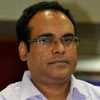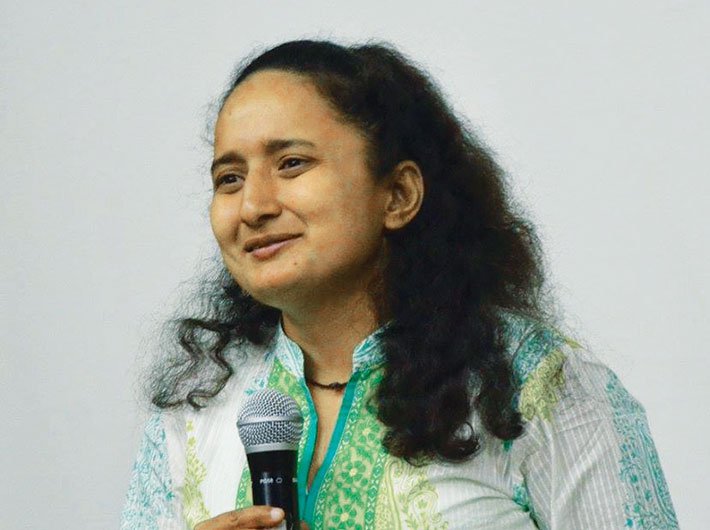Despite her family’s weak financial condition, Pushpa Rawat has made a mark in the world of documentary films, touching lives of the ordinary
Pushpa Rawat comes across as a girl next door until you get to know her and her work better. Rawat makes documentary films, but not just any. It is the unusual style of her films that makes this 28-year-old woman from Ghaziabad, Uttar Pradesh, stand out. Her journey so far, however, has not been a cakewalk.
Coming from a humble background, Rawat did her masters in philosophy from Chaudhary Charan Singh University, Meerut. Later, she took a diploma course in filmmaking. A fortunate encounter with noted film director Anupama Srinivasan changed the course of her life. She took to the camera and started making some very powerful documentaries which have been widely appreciated.
Rawat was in Haldwani on April 30 to participate in the 2nd Haldwani film festival, organised by The Film and Art Guild of Uttarakhand (set up last year by a group of avid film and art enthusiasts to promote documentary films, world cinema and innovative filmmakers).
Documentaries of Vinod Kapri (Achhoot Kanya), Rohit Dhuliya (Wounds of Change and A Plea from the Himalayas), Catherine Addor-Confino (A Choice in the Himalayas), Pushpa Rawat [Mod (The Turn)] and Yousuf Saeed (Khayal Darpan) were screened at this two-day festival. The presence of a fairly decent audience and extremely animated and engrossing discussions followed each show.
But Mod (The Turn), directed and conceptualised by Rawat, had possibly the most profound effect on viewers. It was inspired by the story of Rawat’s own brother and his gang of friends who loitered around an infamous water tank in Pratap Vihar, Ghaziabad. In the film, Rawat audaciously and patiently enters the world of seemingly good-for-nothing youths, addicted to drugs and gambling. ‘Tanki’ (tank) is a place where they drink, smoke and rap. They go there to escape the realities of life; considering it to be their world, they don’t wish to get out. Each of the boys has a story about their family, failures, dreams and aspirations, but refuse to share it with Rawat until they are convinced that ‘didi’ (elder sister), with the camera, is trying to understand them. It took about four months for Rawat to win their confidence. After that, she had to edit 40 hours of video footage to make the film.
The candid interviews with the boys unfolded their lives and fantasies in a very touching and humane manner. Rawat’s camera, capturing conversations with her father, a fourth-class bank employee, her brother and his several spoiled and drug-addicted friends, turn the story of a water tank into a saga of the urban youth, belonging to lower and lower-middle class families, and their hopelessness. The 75-minute film was made under the Early Career Fellowship of the Tata Institute of Social Sciences, Mumbai.
“Her debut film Nirnay (The Decision) was shown at the first Haldwani film festival last year and we all were very impressed. Comprehending her own existence in a lower middle-class society was astounding and extremely brave,” says Ashok Pandey, a poet and writer who conceptualised the festival.
Nirnay, a 56-minute film released in 2012, was widely appreciated for its boldness. It explored why Rawat’s romance with her childhood friend could not culminate in marriage. “The film is my personal journey as I tried to make sense of my own life, and that of my women friends. Set in my neighbourhood on the outskirts of Delhi, it explores the lives of women who are young, educated and bright, but who feel bound and helpless when it comes to taking any major decision regarding their life, be it of career or marriage,” says Rawat.
For Nirnay, Rawat bagged the Pramod Pati Award for the most innovative film at the Mumbai International Film Festival 2014, for its penetrating, up-close and personal interview technique, and for its persistent, caste-busting pursuit of insight and understanding. Apart from a number of other film festivals, Nirnay was also screened at many colleges, organisations and workshops in Delhi, Mumbai and several other cities.
Rawat’s mentor, filmmaker Anupama Srinivasan, is very proud of her. Srinivasan remembers how she could not stop crying after seeing a four-minute shot taken by Rawat while making a small film on blind people; she had captured the darkness in the life of a blind like a genius.
“She is very hard working and has a very different visual sense. She had never seen a camera before we had met. But today, Pushpa has broken the myth that the medium of filmmaking is available only for the privileged class. Others deal with the film subjects as an outsider, but Pushpa is telling the story as an insider. Despite the economic hurdles around her, she would certainly make an impact in the world of cinema in the coming years,” says Srinivasan.
Here is an interview with Pushpa Rawat
Did you ever dream of becoming a film director?
No, I never thought I would become a film director or something else. I belong to a middle class family. We are three sisters and one brother. My father was a peon with Punjab National Bank and is now an office assistant while my mother is a housewife. In middle class families, most of the time, circumstances are against you. What you want to do in your life, you are often not able to. There is no surety that you would be able to fulfill your dreams because your economic condition comes in the way. Faced with such difficult circumstances, the overriding thought in my mind used to be that I should keep moving forward and not bow down before anyone. I think the same even today.
Tell us more about your journey as a filmmaker.
In 2007, I joined the National Bal Bhavan where I learned photography from Ashish Bhattacharya. At the same time there were two options in front of me: either join the videography workshop or take the Nainital trip. Many students had left the videography workshop because of the trip but I decided to stay back. Anupama Srinivasan came and taught us how to see the world through a video camera, how to play with it, and make it your own. Thus, I made my first short documentary on a school for the blind in a group of eight students. Summer holidays and the workshop were over by then. After three months, Srivasan suddenly rang me up and asked me, “Will you work with me?” Without thinking, I replied, “Yes.” I then made another short documentary, Kyon (‘Why do you get angry?’) with my brother Ankur, a friend’s brother Lokender and his friend Lokesh. We shot the film in our own locality in Ghaziabad, and our friends, families and neighbours were all part of the film. I then worked with Srinivasan on the film I Wonder as an assistant director, additional cameraperson and sound recordist. The film was made in three states of India. It is about how children in rural areas experience schools. It is a very beautiful film. After I Wonder, Srinivasan said to me, “Pushpa, why don’t you make your own film now?” I was surprised to hear this. How can such an experienced person tell a novice to make her own films? She believed in me and gave me her handycam. She said, “Make a film on the topic that interests you the most.” So, Nirnay was made. In 2014, the film received the Pramod Pati Award. In my journey so far, from Nirnay to Mod, Srinivasan has played a crucial role in my life and so has Bal Bhavan.
Your new film, ‘Mod’, is a story of your brother and your previous release ‘Nirnay’ documented the break-up of your own relationship. Is it a style you developed or was it a matter of coincidence?
I do not think I have a distinct style nor has it been a matter of coincidence. Whatever I discover in my life, I accept and respond to it. If the School of Media and Cultural Studies, TISS, had not awarded me the Early Career Fellowship I do not think I could have fulfilled my childhood dream of making this film. I wanted to understand the group of boys who always hung out at the ‘tanki’, the space which is two minutes away from my home. That space was, in a way, owned by the boys where they did not want any interference. I wanted to understand them from my heart, my mind; it was my dream to talk to them. I have been curious about that place for the last 25 years and have been looking at it from a distance. I have been contemplating if there is a turn there, where would it lead us – the boys and me. Maybe, I am searching for a turn along with the boys and it seems the turn is far away.
Many people think documentary films are boring, loaded with social messages. How do you respond to this perception?
People do not think like this. They know the value of documentary films. If it is so, perhaps you wouldn’t be interviewing me.
How important are these small film festivals for documentary filmmakers like you?
These small festivals are very important for every documentary filmmaker because her thinking and her work through her films reaches those who in a way are part of the milieu in which the films are made.
You have got huge recognition in a short period of time. How does it feel?
Wonderful! Everything is possible.
Would you ever like to be part of the mainstream cinema?
I will accept everything that life offers me. But I will never stop making documentary films. I am very grateful and thankful to every person at the water tank of Pratap Vihar.
(The interview appeared in the May 16-31, 2016 issue)

